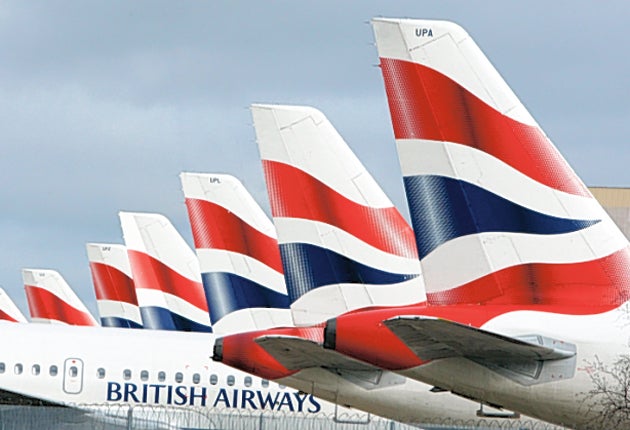Strikes and ash clouds push BA £164m into the red

Your support helps us to tell the story
From reproductive rights to climate change to Big Tech, The Independent is on the ground when the story is developing. Whether it's investigating the financials of Elon Musk's pro-Trump PAC or producing our latest documentary, 'The A Word', which shines a light on the American women fighting for reproductive rights, we know how important it is to parse out the facts from the messaging.
At such a critical moment in US history, we need reporters on the ground. Your donation allows us to keep sending journalists to speak to both sides of the story.
The Independent is trusted by Americans across the entire political spectrum. And unlike many other quality news outlets, we choose not to lock Americans out of our reporting and analysis with paywalls. We believe quality journalism should be available to everyone, paid for by those who can afford it.
Your support makes all the difference.A wave of strikes by cabin crew, coupled with disruption caused by Iceland's volcanic ash cloud, sent British Airways £164 million into the red for the three months to June, the airline reported today.
The double whammy of the bitter industrial dispute with the Unite union and the closure of most of European airspace for almost a week in April cost the carrier around £250 million over the quarter.
Cabin crew have taken 22 days of strike action since March and further walkouts could take place from September unless peace talks next week at the conciliation service Acas lead to a breakthrough.
Chief executive Willie Walsh said he believes the "final" offer rejected by Unite members earlier this month still forms the basis of a resolution to the dispute.
He also made clear he is pressing ahead with contingency plans to deal with further strikes, saying he is confident of running 100% of long-haul flights if there is more industrial action.
Mr Walsh said BA had seen an improved operating performance in recent months despite the disruptions and he still expects the company to break even this year after two years of losses.
The BA boss played down fears of a "double-dip" recession, saying the airline is seeing a "steady recovery" and positive underlying trends in both cargo and passenger traffic.
At the operating level, losses of £72 million were less than the £94 million posted a year earlier, the chief executive added.
The impact of the disruption saw the airline's overall first-quarter revenues fall 2.3% to £1.94 billion. Passenger revenues were down 3.4% after an 11.2% slide in capacity.
But Mr Walsh also flagged up falling operating costs - helped by a lower fuel bill - and added: "Our focus must remain on cost control as we grow and continue our quest for permanent structural change across the business."
The group received a boost this month when it was given US regulatory clearance for its alliance with American Airlines and Iberia on transatlantic flights, as well as agreeing a recovery plan with regulators for its pension scheme.
Speaking about the long-running industrial dispute, Mr Walsh said: "We continue to train volunteer cabin crew and that programme is going very well. I am looking forward to hearing what the trade union has to say in light of the poor turnout in the last ballot.
"I want to reach a resolution but we are preparing for further industrial action. I am confident we will operate 100% of our long-haul services and we are looking at the short-haul programme."
Mr Walsh said the last deal put forward by BA was the "best and final offer" which he described as "very fair", adding: "If the union wanted to bring an end to the dispute, they would have looked to get an agreement and acceptance of the proposal. It addresses all the genuine concerns and I still believe it forms the basis of a resolution to the dispute."
Unite's joint leader Derek Simpson said: "This is a dispute over £10 million. Contrast that with the £164 million in losses this quarter alone and questions must be asked about the direction of BA's management and the sense of them maintaining this dispute with cabin crew.
"It is important to remember that, on every call in this dispute, BA's management has got it wrong. It claimed that crew would accept the offer if Unite put it to them; they did not. Only 15% voted in favour, with 85% finding no appeal in it at all.
"BA also claimed that the majority of crew worked during the dispute but we have processed over 7,000 claims for strike pay - that means 70% of Heathrow crew, the backbone of the BA operation, took strike action.
"These losses bring no pleasure to Unite. It is never our intention to see BA struggle. We would far prefer to see it thrive and the way to ensure this is to settle peacefully with cabin crew."
Bob Atkinson from http://www.travelsupermarket.com said: "BA is definitely flying in the right direction but there's more turbulence to come. The airline's handling of the ash crisis earlier this year was seen as a shining example by customers for its treatment of passengers, and seeing the first BA plane landing at Heathrow was a triumph. But it's the continuing industrial dispute with its cabin crew that's the real problem."
* Virgin Atlantic said that during March, May and June, around 50,000 passengers switched from BA to Virgin, equivalent to around 4,000 each week.
"When strike dates were announced in May, our reservation call centre volumes rose by a staggering 48%, but there is also a longer term trend as passengers dislike the uncertainty BA's industrial relations issues create," said a Virgin spokesman.
Join our commenting forum
Join thought-provoking conversations, follow other Independent readers and see their replies
Comments